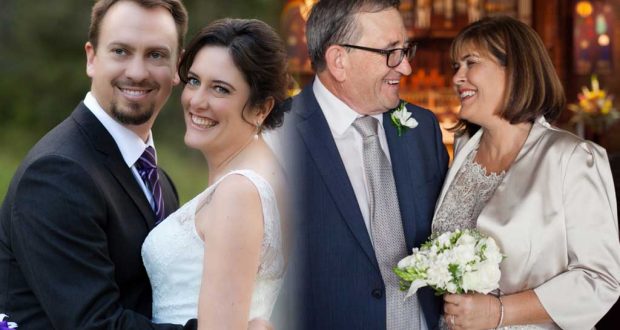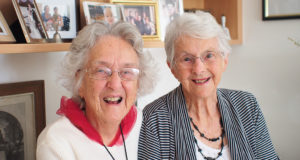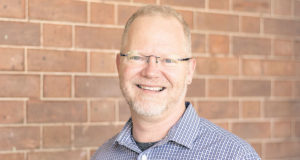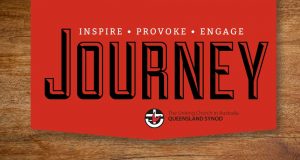No, you don’t need a romantic relationship to complete you—but what if you’re single and you don’t want to be? This Valentine’s Day Ashley Thompson asks eight Christians who met their partners online what factors contributed to their success when navigating the world of online dating.
Think it’s uncommon to find love online? Think again. From the inception of Match.com in 1995 to the launch of Tinder in 2012, today over 4.6 million Australians use online dating services, according to the Australian Competition and Consumer Commission in 2015.
Online dating is now the second most popular way to meet potential partners says eHarmony Australia’s 2015 Relationship Study; and if you didn’t meet them online it’s likely you performed an online background check—along with 69 per cent of singles who admitted to researching their dates.
The once shameful stigma of not being able to find a relationship “in real life” has dissipated as technology has become ubiquitous, bringing online dating into the mainstream.
Rev Matthew Hogg, minister at Fitzroy North Rockhampton Uniting Church, and his wife Andrea say that many people are surprised to hear how they met and, where knowledge is limited, associate online dating with mail-order bride sites or popular hook-up app Tinder.
“People who have never done it before literally don’t understand the process,” says Matthew.
“The media focus on what is sensationalist and so when that person thinks of online dating they think of the only reference point they have, which is probably Tinder or RSVP.”
Avoiding the meat market
Matthew and Andrea were matched on eHarmony in early 2014 while he was studying to be a candidate for ministry in Brisbane. Friends, many of whom had already found love online, encouraged them both to sign up when they were both in their early 30s.
“The moment I tried eHarmony I knew that was the one I wanted to keep going with because of its scientific approach and small selection of matches. The ones that were free didn’t seem to work in the sense that there were too many to choose from and it came down to appearances,” says Matthew.
Coincidentally Matthew and Andrea had friends in common and lived only 15 minutes away from each other, as well as in the same and adjacent suburbs in years gone by.
Similarly, Craig and Jess (not their real names) who met on eHarmony in early 2013 also had friends in common and lived in nearby suburbs. Moreover their parents lived in the same estate only two minutes away from each other.
Both couples recommend online dating to others and advise newcomers to kick dishonesty to the kerb, enlist friends to help fill out your profile and exercise common sense.
“Don’t have your first date in person [e.g. use Skype] and when you do meet make sure it’s in a public place,” explains Craig.
Managing expectations
Greg (not his real name) met his girlfriend on free dating website OK Cupid in late 2015. An avid gamer in his late 20s, his familiarity with technology saw him seek out a site that had the best user-base locally.
“The purely Christian-based ones tend to be more expensive because they have a smaller user-base, so I decided to go where the ‘fish’ were and see if I could filter from there,” says Greg.
Greg says he tempered his expectations and decided to view the experience as a long game. As an introvert, he found it convenient to send a message and reply when he was available as opposed to having to meet at a specific time.
“As a Christian, if you don’t find a relationship at church or something like a university Bible study, there aren’t many places you can actively look unless you stumble across them. The Internet allows you the leverage to specify what you want or where you’re looking which can bring people together,” he says.
Yet similar to real life, Greg was aware that just because someone had listed themselves as a Christian that didn’t necessarily mean they were actively following Jesus.
“It could just mean they grew up in the church, were christened as a baby or once walked through the door, versus what they actually believe. Being a Christian is not just about being nice and if they don’t get that, there are going to be issues down the road when you make a decision they don’t agree with.
“Which is a hard place to put your foot down when you’re talking to a pretty girl but it’s important.”
So has technology made it easier to meet people?
“No,” Greg laughs. “But that’s mostly symptomatic of what we’re like as a culture, we’re a lot more isolated nowadays.”
Testing theology
Gary Wallis and Judy Douglas met on Christian Mingle in late 2013. Having both lost their spouses to cancer, theirs was a unique connection and one that formed quickly.
“At our age you don’t want to ‘go out’ for a couple of years, you’re either going to be together or you’re not. It was clear we were looking at marriage,” says Judy.
“But it’s hard work, it’s not glamorous—you have to sort out the weirdos.”
An IT specialist in his early 60s, Gary was on mission in India dealing exclusively with females when he realised he needed companionship both in volunteering and life after his first wife of nearly 40 years passed away.
“For me it was extremely helpful that Judy was a few years in front of me in grief. She could identify a lot of emotions in me and I think that common journey of grief helped us understand each other better,” says Gary, referencing triggers surrounding past wedding anniversaries and birthdays.
Judy adds, “It helps that we can remember and celebrate our past spouses without offending each other. It feels like they’re a part of our life together.”
Yet the biggest challenge in their courtship wasn’t their past but, interestingly, their theology. Both Gary and Judy were deeply entrenched in their respective Christian denominations.
“I was born and bred in the Uniting Church whereas Judy came from the Sydney Anglican Church, which believes in a vastly different way,” says Gary.
“Not wrong, just different. So we had a number of very robust debates.”
They reconciled on their core beliefs (the Creeds) and were married at Saint Andrew’s Uniting Church by Gary’s best mate, former Uniting Church in Queensland moderator Rev Bruce Johnson.
Both Gary and Judy would recommend online dating, acknowledging it’s a lot harder to meet eligible matches in the latter stages of life when church communities are well established.
They advise to meet in person sooner rather than later and share Facebook profiles to establish trust.
No big, neon sign
Yet for all the advice out there, nothing can beat God’s hand or timing.
Tim (not his real name) met his wife within one month of signing up to Oasis, another free dating website. With little strategy or thought, he set up an account in early 2012 and met this now wife within less than a month.
Tim’s wife had lived on the same side of Brisbane, shared friends in common and attended combined church functions—they had just never met.
The benefit of finding each other online was the ability to actively list themselves as someone who was seeking a romantic relationship, which they may have never known had they met in person.
Matthew Hogg agrees, “You can be talking to someone at a party and then their partner comes to join them and that can be awkward. I did find it a lot easier online to say: I’m here, this is what I’m doing and I’m looking for a partner. If you’re interested let’s talk and if you’re not then go away.”
So until it becomes fashionable for singles to wear flashing neon signs that scream “available”, online dating remains a viable solution to a modern problem.
Matthew sticks it to any lingering stigma: “I’m not embarrassed. No one can make me feel ashamed about how I met my beautiful wife.”
Tips for online dating
- Be honest/be yourself
- Be patient/take it slowly
- Be open but guard your heart
- Never give money to someone you’ve never met
- Manage your expectations
- Be prepared to form a thick skin
- Ask a friend or family member to help you fill out your profile
- Don’t share personal information too quickly
- Share social media profiles
- Have a Skype date before meeting in person
- Meet as soon as possible to avoid being ‘catfished’
(manipulated by a person pretending to be someone they’re not) - For safety, tell a friend the location and time of your first date
- Have an exit plan on your first date
- Introduce them to your family early on
- Pray about it
 JourneyOnline
JourneyOnline







